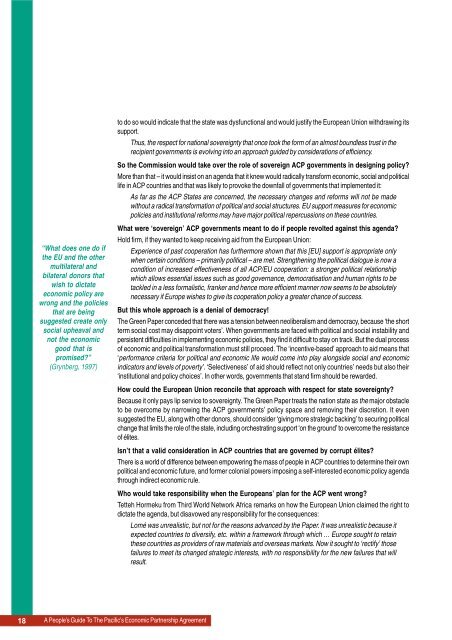REPA Booklet - Stop Epa
REPA Booklet - Stop Epa
REPA Booklet - Stop Epa
You also want an ePaper? Increase the reach of your titles
YUMPU automatically turns print PDFs into web optimized ePapers that Google loves.
to do so would indicate that the state was dysfunctional and would justify the European Union withdrawing its<br />
support.<br />
Thus, the respect for national sovereignty that once took the form of an almost boundless trust in the<br />
recipient governments is evolving into an approach guided by considerations of efficiency.<br />
So the Commission would take over the role of sovereign ACP governments in designing policy?<br />
More than that – it would insist on an agenda that it knew would radically transform economic, social and political<br />
life in ACP countries and that was likely to provoke the downfall of governments that implemented it:<br />
As far as the ACP States are concerned, the necessary changes and reforms will not be made<br />
without a radical transformation of political and social structures. EU support measures for economic<br />
policies and institutional reforms may have major political repercussions on these countries.<br />
“What does one do if<br />
the EU and the other<br />
multilateral and<br />
bilateral donors that<br />
wish to dictate<br />
economic policy are<br />
wrong and the policies<br />
that are being<br />
suggested create only<br />
social upheaval and<br />
not the economic<br />
good that is<br />
promised?”<br />
(Grynberg, 1997)<br />
What were ‘sovereign’ ACP governments meant to do if people revolted against this agenda?<br />
Hold firm, if they wanted to keep receiving aid from the European Union:<br />
Experience of past cooperation has furthermore shown that this [EU] support is appropriate only<br />
when certain conditions – primarily political – are met. Strengthening the political dialogue is now a<br />
condition of increased effectiveness of all ACP/EU cooperation: a stronger political relationship<br />
which allows essential issues such as good governance, democratisation and human rights to be<br />
tackled in a less formalistic, franker and hence more efficient manner now seems to be absolutely<br />
necessary if Europe wishes to give its cooperation policy a greater chance of success.<br />
But this whole approach is a denial of democracy!<br />
The Green Paper conceded that there was a tension between neoliberalism and democracy, because ‘the short<br />
term social cost may disappoint voters’. When governments are faced with political and social instability and<br />
persistent difficulties in implementing economic policies, they find it difficult to stay on track. But the dual process<br />
of economic and political transformation must still proceed. The ‘incentive-based’ approach to aid means that<br />
‘performance criteria for political and economic life would come into play alongside social and economic<br />
indicators and levels of poverty’. ‘Selectiveness’ of aid should reflect not only countries’ needs but also their<br />
‘institutional and policy choices’. In other words, governments that stand firm should be rewarded.<br />
How could the European Union reconcile that approach with respect for state sovereignty?<br />
Because it only pays lip service to sovereignty. The Green Paper treats the nation state as the major obstacle<br />
to be overcome by narrowing the ACP governments’ policy space and removing their discretion. It even<br />
suggested the EU, along with other donors, should consider ‘giving more strategic backing’ to securing political<br />
change that limits the role of the state, including orchestrating support ‘on the ground’ to overcome the resistance<br />
of élites.<br />
Isn’t that a valid consideration in ACP countries that are governed by corrupt élites?<br />
There is a world of difference between empowering the mass of people in ACP countries to determine their own<br />
political and economic future, and former colonial powers imposing a self-interested economic policy agenda<br />
through indirect economic rule.<br />
Who would take responsibility when the Europeans’ plan for the ACP went wrong?<br />
Tetteh Hormeku from Third World Network Africa remarks on how the European Union claimed the right to<br />
dictate the agenda, but disavowed any responsibility for the consequences:<br />
Lomé was unrealistic, but not for the reasons advanced by the Paper. It was unrealistic because it<br />
expected countries to diversify, etc. within a framework through which … Europe sought to retain<br />
these countries as providers of raw materials and overseas markets. Now it sought to ‘rectify’ those<br />
failures to meet its changed strategic interests, with no responsibility for the new failures that will<br />
result.<br />
18<br />
A People’s Guide To The Pacific’s Economic Partnership Agreement
















